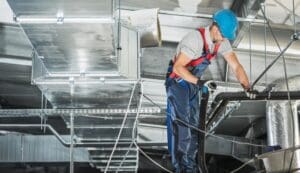Britain’s retailers are losing more than £146 million each year by failing to modernise their estates in line with net zero targets, new research has warned.
Analysis by Mitsubishi Electric found that outdated heating, ventilation and air conditioning (HVAC) systems are leaking energy and inflating costs across one of the UK’s most energy-intensive industries. Despite recognition that sustainability can boost financial performance, almost half (43 per cent) of retail operations managers said net zero was not treated as a business priority because returns on investment fall outside immediate trading years.
The study, which surveyed 500 retail facilities managers, suggests that the industry is at risk of falling badly behind government climate goals. More than a third of shops are expected to remain non-compliant by 2030, leaving them vulnerable to becoming “stranded assets” – too costly or impossible to rent due to poor environmental performance.
HVAC accounts for up to 60 per cent of a store’s energy use, yet just over half of facilities managers (54 per cent) said they had already upgraded their systems. The rest remain reliant on ageing equipment that is draining budgets and undermining sustainability commitments.
Chris Newman, Zero Carbon Design Manager at Mitsubishi Electric, said the retail industry accounted for around 16 per cent of the UK’s non-domestic building space – representing both a challenge and an opportunity.
“This offers a substantial chance to decarbonise at scale, starting with identifying the ‘easy wins’ now and reviewing the systems responsible for heating, ventilating and cooling these spaces,” he said. “In-depth understanding of how this equipment operates means facilities managers are uniquely positioned to support the delivery of net zero estates in future.”
While many managers understand the case for action, the report highlights that they are often constrained by corporate structures. More than a third have no control over budgets or decision-making for net zero projects, while 42 per cent said they had received no clear direction from senior leadership. One in five said net zero was not included in their performance targets at all.
This lack of empowerment, the report argues, is stalling progress at a time when investor expectations on sustainability are increasing and regulations such as the Minimum Energy Efficiency Standards (MEES) are expected to tighten.
Already, 35 per cent of operations managers believe more than a third of their estate could become stranded assets if MEES thresholds are raised. That prospect is already having financial consequences, with £146 million in annual energy losses linked to equipment that should have been replaced with modern, efficient alternatives.
Despite the scale of the challenge, experts argue that adapting estates need not be complex. HVAC systems, often responsible for the lion’s share of a retail building’s energy consumption, can be upgraded with relatively simple interventions such as replacing indoor and outdoor units while retaining existing pipework.
Such upgrades, Newman said, could deliver immediate energy savings, ensure compliance with incoming regulations, and protect asset values.
“The longer we leave it, the harder adapting these buildings is going to get,” he added. “Now is the time for retailers to be creating long-term strategies that align business as usual with concrete commitments for energy reduction.”
The findings underscore the mounting pressure on retailers to align operational resilience with environmental responsibility. With consumers, investors and regulators increasingly focused on sustainability, the research warns that those who delay risk higher costs, reduced competitiveness, and the erosion of asset value.
As Newman concluded: “This is about future-proofing the industry. Acting now will allow retailers to stay compliant, competitive and operational in an increasingly sustainability-minded market.”
Read more:
UK retailers risk £146m annual losses without net zero upgrades











